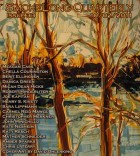Carmel, I’ve been wanting to talk to you since I first read “Jamila.” It’s a powerful story. The main character who serves as the narrator manages to be sympathetic — if not empathetic — as a young man whose obligation to his family and his culture compels him to do a terrible deed. The opening line immediately sets up the stakes of the story: “The first time I went to kill my sister I couldn’t do it.” I’m curious if this line was the genesis of your story or did something else trigger your desire to write about this issue?
I read an interview with a seventeen-year-old Pakistani boy who had been forced by the men in his family to kill a sister that he loved. Apparently, it’s not uncommon for this job to fall on juvenile males because the penalty (if they are charged at all) is more lenient — it averages about 4 months. I was struck by the pain in the boy’s words and it occurred to me that, as horrific as his crime was, he was as much a victim as his sister. I hoped the opening line would capture not only the terrible nature of his crime, but a sense of his humanity as well.
The setting of this story is ambiguous yet you manage to create vivid images. What kind of research did you do and how did you pick and choose your details? In other words, did you write a longer story based on your research and then edit for maximum effect? What was your thinking as you did this?
I haven’t been to the Middle East. It’s an interesting challenge to write from the point-of-view of a character whose experience is so different from my own. I’ve done a lot of reading on the subject and watched films and documentaries. Rana Husseini’s important book, Murder in the Name of Honor, as well as her work at the Jordan Times, was a tremendous resource. Muslim friends and friends who’ve lived in the Middle East helped me with the language.
Early drafts were much longer, but I wanted to pare the story down to its core and only include those details that created both a sense of place and a visual image that Westerners could identify with.
Your story seems to operate on two stages, the intimate and the global. Can you talk a little bit about why you were drawn to a story about a family that demands the strictest adherence to a set of rules with the death of two human beings as the final consequence?
I hoped to challenge the concept of “the other” that we’ve heard so much of in the media since 9/11 — the implication that this kind of extremism is somehow related to Islam. Of course, there is no faith or race or political system that hasn’t been used to justify violence. It’s easy to forget that at the heart of the violence, whether it is in Pakistan, or Norway, or Germany, or on the plains of the United States territories, it is a human being making a personal choice. That’s something that goes deeper than familial traditions or societal morals — deeper than the external consequences of whether society will punish or celebrate that individual.
You reference “the other.” I take to mean “someone different from me.” Could you talk about that a little more about the concept as you mean it?
Yes, I think it’s human nature to establish something like a caste system when we think of ourselves in relation to others. Maybe there’s a fundamental need for a sense of superiority in order to justify our own violent actions. In warfare, derogatory racial terms allow us to dehumanize the enemy, and I think that’s true in economic warfare, as well. In reality, we are much more alike than different.
According to your bio, your writing focus is on “the history, politics, religion, spirituality and traditions of England and the Middle East.” Can you tell us more about your interests and what you have planned for publication in the future?
I’m working on a three part novel about a 13th-century knight who journeys to the Middle East with the Tenth Crusade and meets Rumi. The novel explores the black and white religious and chivalrous thinking of the time and its evolution through the introduction of Eastern mysticism. I thought there were some interesting parallels between the 13th century Western and Eastern paradigms and the way the adolescent brain develops — from black and white thinking to distinguishing shades of gray. And, yes, there is a dragon involved.
The research for my novel was the catalyst for a collection of Middle Eastern stories, of which “Jamila” was the first. Also, I’ve recently established a non profit, Writing for Peace, that is dedicated to breaking through misconceptions about “the other” and developing cultural empathy through creative writing. Starting this year, we are sponsoring an annual writing contest for high school students and eventually plan to host workshops here in the Rocky Mountains that bring young writers together from all over the world. For more information, or to learn how you can become involved, please go to www.writingforpeace.org.
I’m looking forward to that novel…and the dragons. With that in mind, who are some of your favorite authors?
Growing up, I escaped into the worlds of J.R.R. Tolkien, C.S. Lewis and Ursula K. Le Guin. My husband and I read all of J.K. Rowling’s books with our children and fell in love with Harry. It’s difficult to narrow down my favorites. The authors I am most inspired by are those, across many genres, who achieve a high level of integrity in their writing. Some of these are Noam Chomsky and Bernard Lewis, Denis Johnson, Elif Shafak, William Haywood Henderson, Jennifer S. Davis and Vicki Lindner, Tobias Wolff, Flannery O’Connor, Raymond Carver, Alice Munro, Sandra Cisneros and Robin Black, J.M.G. Le Clezio and Gabriel Garcia Marquez, Dylan Thomas, Coleman Barks, William C. Chittick, Hafiz, Lalla and Jalalu’din Rumi. This is just scratching the surface, and I have to say I’ve been inspired by many of the writers featured in Smokelong Quarterly.



 The SmokeLong Grand Micro Contest (The Mikey) is now an annual competition celebrating and compensating the best micro fiction and nonfiction online.
The SmokeLong Grand Micro Contest (The Mikey) is now an annual competition celebrating and compensating the best micro fiction and nonfiction online.